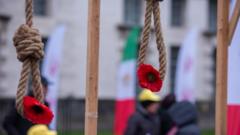With a significant jump in executions, particularly those connected to drug offenses and political dissent, the UN urges Iran to reconsider its stance on the death penalty, amid growing national and international scrutiny.
Surge in Executions: Iran's Grim 2024 Report Highlights Alarming Death Penalty Trends

Surge in Executions: Iran's Grim 2024 Report Highlights Alarming Death Penalty Trends
The United Nations reports a troubling increase in executions in Iran, with at least 901 recorded in 2024, marking the highest number in nine years.
At least 901 individuals were reportedly executed in Iran during 2024, according to a recent report from the United Nations, marking a 6% increase from the previous year and the highest number recorded in nearly a decade. This surge comes as the UN’s human rights chief, Volker Türk, expressed deep concern over this grim trend, urging the Iranian authorities to halt further executions and implement a moratorium aimed at the eventual abolition of the death penalty.
The data, noted to have come from various credible organizations, including Iran's Human Rights Activists News Agency (HRANA) and Iran Human Rights (IHR), revealed that the bulk of executions were attributed to drug-related offenses. Notably, the report also indicated that dissidents and individuals associated with the wave of protests that erupted in 2022 faced execution, alongside a troubling increase in the number of women executed—a finding echoed by a report from Norway-based IHR, which indicated that 31 women were executed in 2024, the highest since tracking began 17 years ago.
Among these women, some were convicted for murder after tragic circumstances, while others faced capital punishment for drug offenses, including cases where individuals were misled into drug trafficking. Critics argue that such offenses do not meet the international law criteria for "most serious crimes" that warrant the death penalty.
The report by Kurdish human rights group Hengaw indicated that a significant proportion of those executed belonged to Iran's ethnic minorities, particularly Kurds, highlighting a pattern of systemic discrimination during the government's crackdown on dissent following the "Woman, Life, Freedom" protests ignited by the death of a young Kurdish woman.
Moreover, HRANA’s findings that five juvenile offenders were executed drew international condemnation, given existing prohibitions under international law against the death penalty for those under 18 at the time of their offense. Amnesty International reiterated that Iran accounted for 74% of all recorded executions worldwide in 2023, a statistic that raises continued scrutiny, especially since data from China—a country believed to execute thousands—remains classified.
As calls for reform grow, the UN emphasizes that the death penalty contradicts the fundamental right to life and increases the risk of wrongful executions, urging the Iranian government to reassess its punitive approach amid rising global concern for human rights in the country.





















